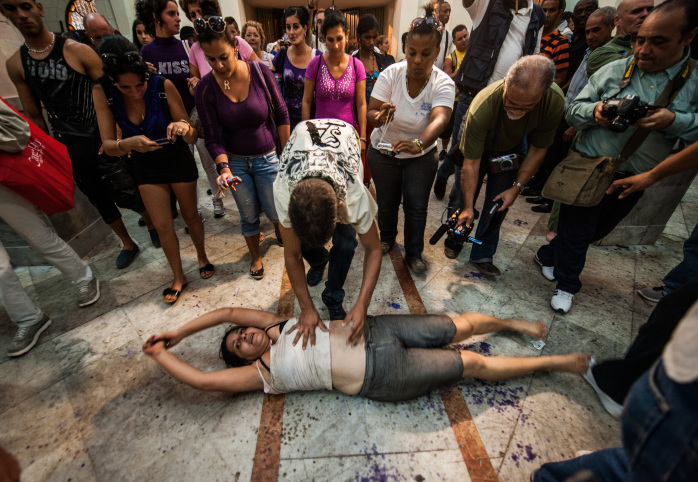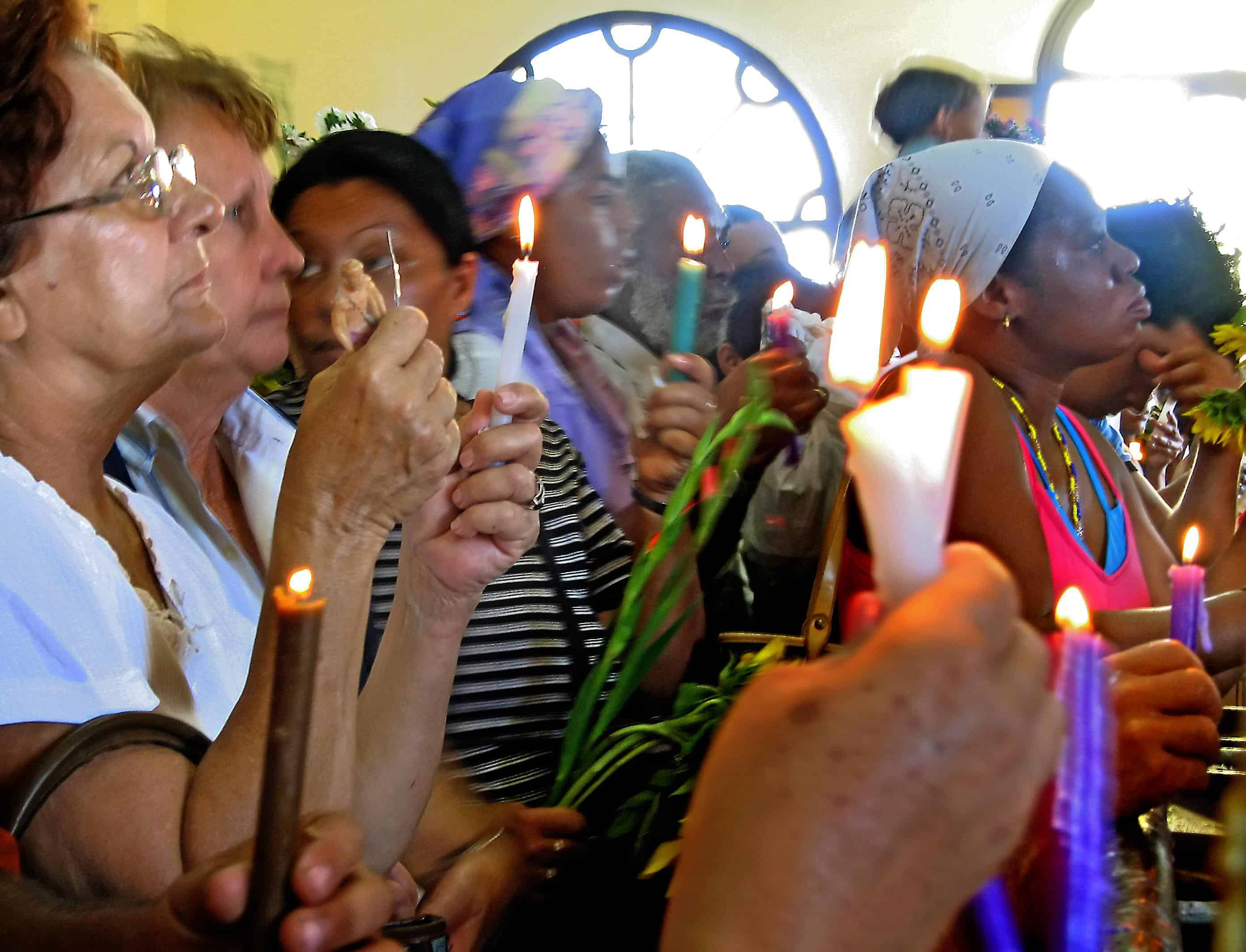ANN ARBOR, Michigan — I walk a tightrope with Cuba.
I’m a daughter of Cuban exiles who’ve pledged not to return until there is political change. Yet I’ve traveled to the island numerous times since the early 1990s; it’s the site of my research as a cultural anthropologist.
I never forget that every trip back is an insult to my parents, and that their immigrant labor has made possible my education and my privilege to travel back and forth to my native land. “Be careful, Ruti,” they say. “Don’t talk too much.”
When we left in the early 1960s, we were labeled “gusanos,” or worms, of the revolution, and traitors, maligned for choosing to immigrate. Despite all of my trips, my parents’ paranoia is lodged like shrapnel in my memory. I’m an American citizen, but having been born in Cuba I’m required to return to the island with a Cuban passport.
I fear Cuban authorities will find a Kafkaesque reason to stop me at the border and not let me out. Still, I return and return. The island was a refuge for my Jewish grandparents in the mid-1920s, at a time when the United States was imposing cruel quotas on European Jewish immigration. And I feel a bond, deep and mysterious, to this place, so small and yet so important to modern history.
When I awoke to the news of President Barack Obama’s proposed U.S. policy changes, I immediately thought: Isn’t it amazing that this occurred on Dec. 17? It’s a day of great significance to Cubans, when thousands of them make an annual pilgrimage to the shrine of Rincón to mark the feast day of San Lázaro.
The shrine, on the outskirts of Havana, has an exact replica in Hialeah, Florida. Represented as a beggar, whose patrons are sick and poor, this popular saint in Spanish Catholicism is referred to as Babalu-Ayé in the Afro-Cuban religion known as Santería. Americans who remember the “I Love Lucy” TV show will recall Desi Arnaz belting out songs in honor of Babalu-Ayé. Once at Rincón, often getting there on bloody knees, Cubans call to San Lázaro and to Babalu Ayé, asking for relief from their pain and sorrow. It is a moving, wrenching experience to witness, as I have in years past.
Santeros will tell you: Nothing happens by accident; everything happens for a reason. All Cubans (even Jewish Cubans like me) share something of Santería in our cosmology, so I take it as significant that Obama made his announcement on that feast day. After decades of official U.S. hostility, Obama is asking Americans to open their hearts to Cuba, the island that has paid a price for daring to act against the will of the great power 90 miles to the north.
The Cuban people need to heal from their wounds, too. We need to find ways to communicate despite our differences so Cubans of all generations, social classes, racial backgrounds and political persuasions, on and off the island, can learn to coexist respectfully with one another. This requires acknowledging loss and grief and still moving on. The majority of Cubans have been born since the revolution, and more than anything what they wish for is peace.

Obama’s mother was a cultural anthropologist, and Obama knows something about the importance of cultural symbols.
In his speech, he referred to the popular phrase “No es fácil.” Technically, that means “It’s not easy.” But Cubans on the island use this phrase all the time to mean something more — that even though nothing is easy in a country where monthly salaries average $20, people still live their lives with zest, creative ingenuity and the resourcefulness for which Cubans have become famous.
Most significantly, Obama cited the words of the beloved Cuban hero José Martí: “Liberty is the right of every man to be honest, to think and to speak without hypocrisy.” Martí, a poet of the late 19th century who admired and translated Walt Whitman, spent most of his adult years in exile in New York, planning Cuba’s war of independence from Spain.
He thought of himself as living in “the belly of the beast,” always fearing the United States would steal Cuba’s victory, as in fact it did. Not surprisingly, Cuba is a country overrun with busts and statues of Martí, because it is believed that U.S. interference in Cuban affairs cut Martí’s revolution short. In acknowledging Martí, Obama made clear that the fraught history between both nations cannot be erased but that reconciliation is still possible.
It is not too far-fetched to think of the break between the United States and Cuba as a divorce. The two nations once had incredibly close ties; they were like “carne y uña,” as we say in Spanish, like flesh and nail. My mother likes to tell the story of how on her honeymoon in the beach resort of Varadero, in 1956, she and my father struck up a friendship with a couple from Philadelphia, who were there to celebrate their honeymoon, too.
“I Love Lucy” epitomized the romance between Cuba and the United States. By loving Lucy, Desi loved the United States. These two extraordinary actors enacted a romance that was an apt metaphor for the political relationship between the two nations. Their painful real-life divorce seemed to foretell the pain of the embargo imposed on Cuba by the United States after the island chose to pursue a path that challenged American power and hegemony.
The analogy isn’t perfect. The intransigence between Cuba and the United States has also to do with male pride and male honor. Cuba wasn’t going to bend to America because it didn’t want to be placed in the subservient colonized role again. And the United States wasn’t going to bend to Cuba, because America was, after all, the super power. Rather than a duel, a stalemate was reached that could have gone on forever. Many still wish it would.
Obama has had to walk his own tightrope in reaching out to Cuba. Compassionately calling for dialogue and cooperation, he has also emphasized the importance of American values, including democracy, human rights and the free flow of information, commerce and finance.
When my mother called on the phone from New York to discuss the news, she was so caught up in the excitement, she told me, “¡Poco a poco, vamos a ir a Cuba!” Little by little, it looks like we’ll be going back to Cuba! But then my father came into the room. Not wanting to argue directly with me, he muttered loudly enough so I could hear in the background, “Get ready for another 50 years of tyranny in Cuba.”
Which will it be? Can I hope that one day soon my parents will agree to visit Cuba with me so I can see it through their eyes? I fervently hope so.
It is a Cuban custom to bring pennies to San Lázaro, hoping they will translate into miracles. Even my father likes to scatter pennies on the porch of his house in Queens. Once, when I tried to pick them up, thinking he’d dropped them there by accident, he told me, “Don’t touch those pennies.”
Right now, I don’t know whose promise of miracles to believe in more — those of San Lázaro and Babalu Ayé, or those of President Obama. Maybe both. Maybe both.
Behar, a professor of anthropology at the University of Michigan, is the author of “An Island Called Home” and “Traveling Heavy,” which tell the story of her return journey to Cuba.
© 2014, The Washington Post






